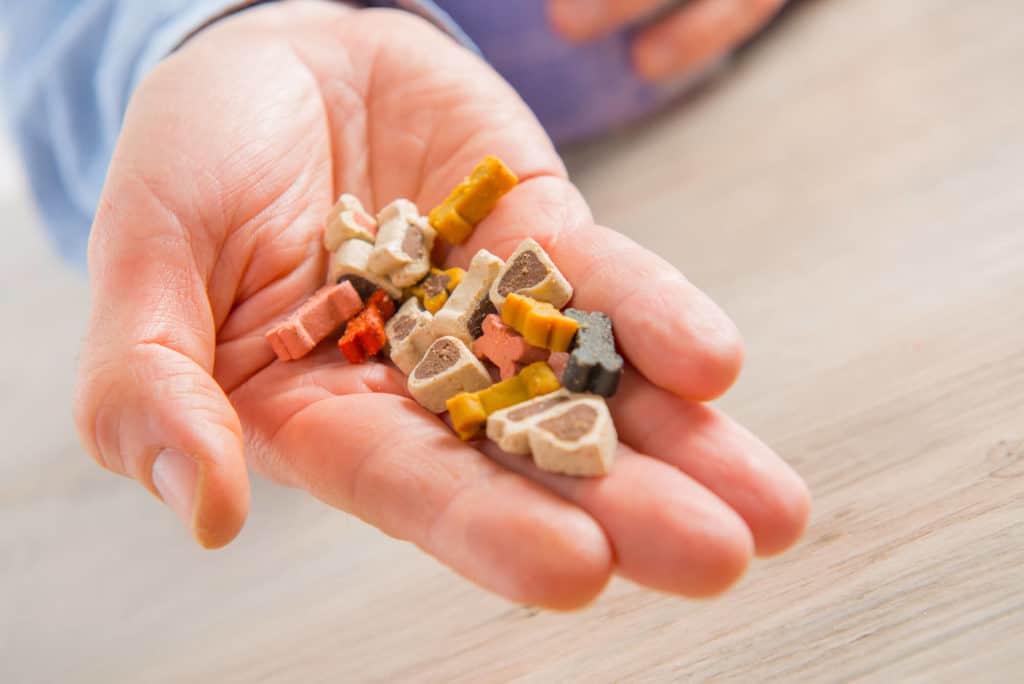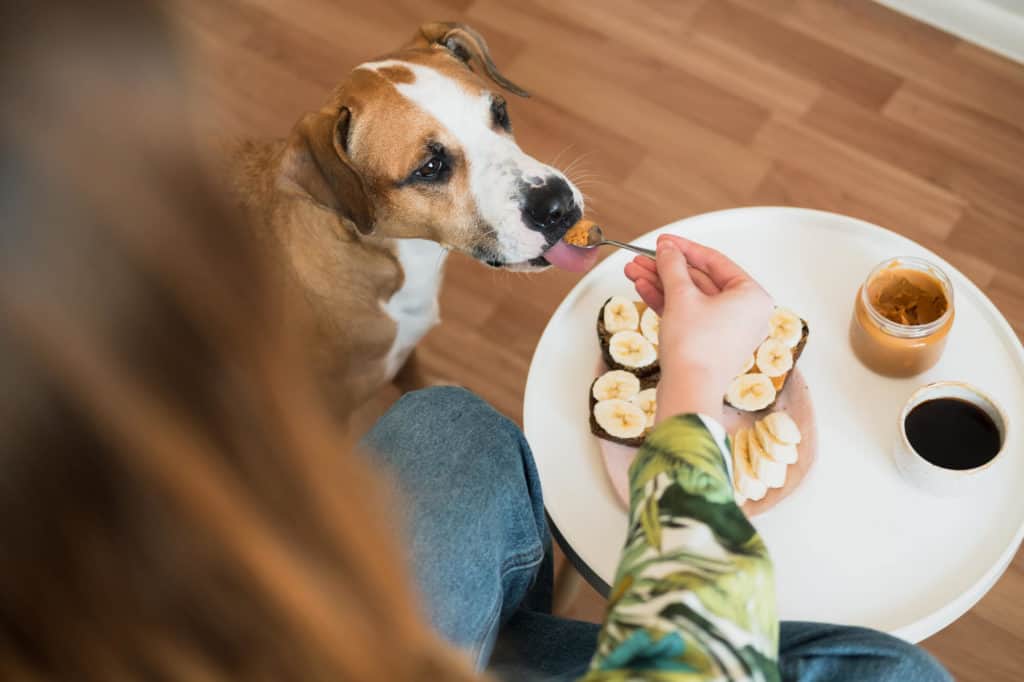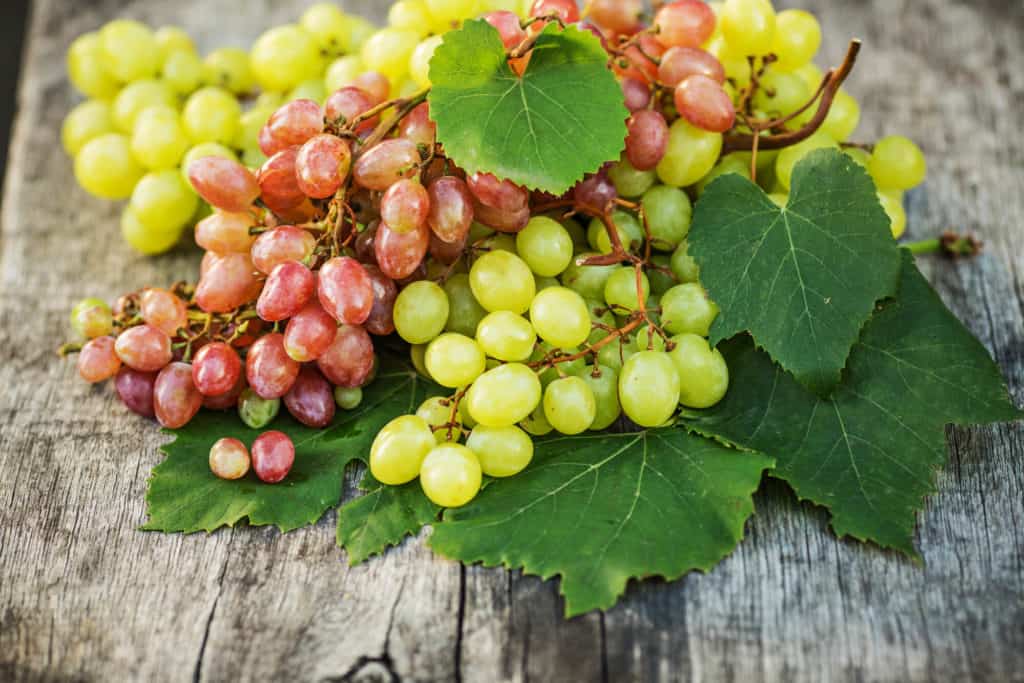Ideally, you should give your puppies delicious and nutritious treats that entice them to respond to training. For example, store-bought treats, meat, fruits, and vegetables are all delicious options for your puppy to savor.
However, 8-week-old puppies have only recently become dependent on dog food.
So, what treats can I give my 8-week-old puppy? There are many options, but it’s best to be careful when introducing treats, especially homemade ones or table scraps.
5 Healthy Treat Ideas for 8-Week-Old Puppies
At eight weeks, your pup should be eating around four main meals daily at roughly equal intervals. In between those meals, you might want to add a treat or two for training purposes.
Here are five simple treats that you can use as a rewarding system for your little buddy:
1. Regular Dog Food
As surprising as this may seem, most eight-week-old puppies aren’t really aware that their regular puppy food isn’t special.
That’s why you can use a mini portion to motivate young puppies while training. However, they’ll soon realize this trick and start demanding other treats.
So, while it’s convenient, it’ll only be a temporary option in most cases.
2. Store-Bought Puppy Treats

There are more brands of puppy treats than you can keep track of, and most come with delicious flavors too.
The only way to determine whether you should stick with particular store-bought treats or not is through trial and error.
That said, it’s crucial to check the ingredients before buying dog treats. After all, you must ensure they’re healthy, especially if your puppy has allergies.
Here’s what to look for in commercially-sold dog treats:
Natural
For a starter, try to steer clear of any additives and preservatives. Instead, the bulk of the treats should be natural ingredients.
If it contains meat, make sure it’s high-quality, grass-fed cuts and not just meat by-products.
Low-Carb
The treat also should be low in carbs. While pet food carbs like wheat, corn, and rice aren’t harmful, too many of them can increase your puppy’s weight.
3. Meat
Dogs savor meat, and it should make up the highest percentage of their diet. However, you shouldn’t feed your puppy undercooked meat or any bones, as that may harm them.
You can feed them all types of meat products like beef, veal, fish, liver, and chicken.
Before giving meat treats, one thing to keep in mind is to cut them into pea-sized chunks. That way, you won’t exceed your puppy’s recommended caloric intake and will also make it easier for them to chew.
That said, you may want to stay away from meat jerkies. That’s mainly because meat jerkies contain added salt and spices, which can cause gastric upset for young pups.
In addition, a typical jerky is usually hard, so it can be difficult for an 8-week-old puppy to chew.
Helpful Dog Health Resource:
Note: Our Health is #1 Priority. It should be no different for your dog. But you need to help him. The Ultimate Guide to Dog Health is the answer. This handy guide will help you recognize the symptoms of the health problems above. Get the knowledge to stay ahead of these terrible issues that can rob your lovely dog from vigor and life. Help your friend make it to 14 yrs+ without pain and suffering.
4. Vegetables and Fruits
The perk of getting an 8-week-old puppy is that you can accustom them to fruits and vegetables early on.
While dogs mainly feed on meat, they’re still omnivorous animals. This means that it’s perfectly fine to give them vegetables and fruits occasionally.
Before treating your pups with vegetables and fruits, try to soften them a bit to make them easier to digest. You can also cut them into small chunks, so they’re not a choking hazard.
A bonus tip, if your puppy is teething, freeze these healthy snacks before serving them to help soothe gum pain.
Here are a few fruit and vegetable treats to feed your puppy:
- Carrots
- Cucumbers
- Broccoli
- Beans (Canned beans are also fine, but ensure they’ve no added salt.)
- Peas
- Pumpkins
- Blueberries
- Apples
5. Peanut Butter

Like humans, dogs go nuts for peanut butter. Peanut butter is generally safe for dogs and can be a great source of healthy fats.
Just make sure it’s entirely made of peanuts and doesn’t contain any added salt or sweetening agents.
Helpful Dog Training Resource:
For help with training your dog, you should take a look at The Online Dog Trainer by Doggy Dan. Doggy Dan is an expert Dog Trainer based in New Zealand. His online resource contains Hundreds of Excellent Dog Training Videos that will take you step-by-step through the process of developing a healthy, happy well-behaved dog.
5 Ingredients to Avoid in Table Scrap Dog Treats
During mealtimes, your puppy might come staring at your food, waiting for you to offer a bite or even a finger lick.
However, your nice gesture of feeding table scrap to your puppy could be unintentionally harming your little pup.
Below are five human snack ingredients that you should avoid giving to dogs as treats:
1. Caffeine
Never feed your puppy caffeinated food like energy drinks, soda, coffee, tea, cocoa, and chocolate (not even on valentine’s day).
Caffeine is toxic, and when ingested (even in a small dosage) by your puppy, it can cause poisoning symptoms, including:
- Vomiting
- Panting
- Diarrhea
- Irregular heartbeats
- Potentially fatal seizures
Aside from caffeine, chocolate also contains theobromine. That’s a chemical substance that dogs can’t metabolize safely and could potentially build up to high toxic levels.
2. Macadamia Nuts
Macadamia is poisonous to dogs that even ingesting small doses will cause symptoms like:
- Weakness
- Muscle twitching
- Fever
- Vomiting within 12 hours
You should also stay away from other types of nuts. Even if they aren’t toxic to your dog, they’re small and may choke your puppy, especially almonds.
3. Xylitol
Xylitol is an artificial sweetener in many foods,like candy, sugar-free beverages, sauces, and jams. Some brands of peanut butter can even contain xylitol.
Upon ingestion, your puppy can show early symptoms like vomiting and fatigue.
Xylitol will also cause high levels of insulin secretion, eventually leading to low blood sugar or hypoglycemia.
As a result, liver enzyme levels increase to regulate the low glucose levels, leading to liver failure.
4. Grapes and Raisins

In canines, grapes and raisins can cause food poisoning and kidney failure within hours of ingestion.
The exact mechanism of why grapes and raisins cause kidney failure is still a mystery. However, recent findings point to tartaric acid as the culprit.
5. Onions and Garlic
Fresh, powdered, or even dried onions and garlic can be toxic to your puppy when ingested in large doses. Typically, your puppy will show symptoms like:
- Abdominal pain
- Vomiting
- Diarrhea
What’s more, they contain a chemical (N-propyl disulfide) that damages hemoglobin, leading to anemia. This anemia can lead to severe organ failure and death if left untreated.

Paul has been creating content for the dog niche for many years. The information he shares comes his first hand experience growing up in dog lovers household and then owning multiple dog breeds of his own as an adult. Paul enjoys doing the hard research to collect, analyze and present our dogtemperament.com readers with the best answers to their questions.